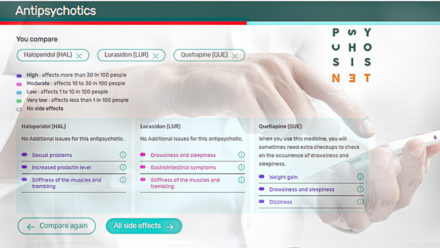
Side effects are different per medicine AND per individual. When starting your medication, side effects usually start out stronger, before the medicine starts to have its desired effect. It can take several weeks before the positive effects of the medicine become clear. Always discuss side effects with your therapist.
The most common side effects of “first generation” and “second generation” antipsychotics are listed below. You can find more information about specific medicines in the patient information leaflet or at the international website https://medlineplus.gov/
Most common side effects of “first generation” antipsychotics (can occur with “second generation” as well):
- Stiffness and shaking;
- Restlessness;
- Movement of jaw, lips and tongue;
- Sexual problems due to hormonal changes.
Side effects mostly seen with “second generation” antipsychotics (but can occur with “first generation” as well):
- Tiredness and slowness;
- Weight gain;
- Increased risk of diabetes;
- Sexual problems due to hormonal changes;
- Constipation;
- Dry mouth;
- Blurred vision.
“Second generation” (or atypical) antipsychotics cause less movement problems as a side effect, but it can still happen. If this happens, talk to your doctor about it. And always keep an eye on the effect and side effects of your medication. A good way to do this is by filling out the antipsychotics check lists from time to time and/or by using the app PsyMate. This is certainly a good idea if you are changing to a lower or higher dosage or switching to a different medicine.
Are you prescribed with antipsychotics and do you sometimes take drugs and/or alcohol? Know that these substances can make some side effects (much) milder, or instead make them worse.
Metabolic syndrome
It is well-known that antipsychotics often cause side effects, but there is less attention for the fact that these medicines can also cause type 2 diabetes, obesity and disrupted fat metabolism. These problems combined are also known as the metabolic syndrome.
Read more about metabolic syndrome.
External websites:
- Medline Plus Information about specific medicines and patient leaflet
- Mind.org on info about driving and medication




